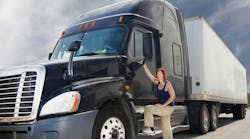Fuel taxes
Trucking, motorist, and business groups alike are lining up to support an increase in gasoline and diesel fuel taxes as a way to fund both maintenance and expansion of America’s roadways, But there’s a caveat: They only want the hike if monies so raised are dedicated strictly to roadway needs and not diverted to ancillary transportation projects.
“Obviously, fuel taxes are a tried and true method for raising funds to pay for roadways needs – there’s no need to reinvent the wheel when it comes generating roadway funding,” David Heller, director of safety and policy for the Truckload Carriers Assn. (TCA), told FleetOwner. The organization originally announced its support of a fuel tax increase at its annual meeting back in March.
“Truckers for the most part will support higher fuel taxes but if, and only if, that money is dedicated to the roadways,” Heller added. “If that tax money were to go anyplace else, such as bicycle paths, then we want no part of a [fuel tax] increase.”
“We recognize the need for additional revenues to support our nation’s highway and bridge infrastructure program … and also strongly support the continued reliance on the federal fuels tax – both diesel and gasoline – as the primary funding source for the Highway Trust Fund,” said Barbara Windsor, president & CEO of fuel hauler Hahn Transportation and second vice chair of the American Trucking Assns. (ATA) in recent testimony before Congress.
“Consequently, ATA will support an increase in those fuel taxes – provided the revenues go to improving the ability to move the nation’s freight,” Windsor said. “ATA believes the current highway program does not meet the needs of either passenger or commercial transportation.”
“We know from research we’ve conducted that the public wants transportation improvements, and they would be willing to pay for them if they had more confidence in how their money is being spent,” said Robert Darbelnet, president & CEO of AAA, also in testimony before Congress. “The public isn’t interested in business as usual. They want accountability, results, and the ability to see how increased investment improves their travel experience.”
Darbelnet noted that two congressionally appointed, bipartisan transportation commissions have studied the roadway funding issue from every angle and – although they differ slightly in the magnitude or timing of specific alternatives – reached similar conclusions; namely, that fuel taxes need to be increased.
“Granted – the timing is not great given the economic challenges facing the nation,” said Darbelnet. “But we are undeniably at a crossroads with transportation funding, and we can’t put off the tough decisions any longer. AAA will support a gas tax increase, provided it’s tied to a significantly restructured program that is performance based, and ensures accountability and transparency.”
He stressed that AAA agrees with experts who have concluded that, at least for the next decade, the federal gas tax remains the best way available to generate significant amounts of revenue. “It is fraud-resistant, easy to administer, and it maintains the user-fee principle that has served as the backbone of the transportation program for over 50 years,” Darbelnet said.
“The simplest, most straightforward way to raise money is through a modest increase in gasoline and diesel taxes,” commented Thomas Donohue, president & CEO of the U.S. Chamber of Commerce. “The U.S. Chamber has never been accused of being a strong proponent of any kind of tax increases. But fuel taxes are different – they are user fees.”
He said motorists would get a tremendous return on their fuel tax “investments,” which include reduced congestion, fewer fatal crashes due to poor road conditions, and lower prices on most products due to smaller shipping costs.
“The challenge is that gas tax revenues – which are not indexed to inflation and have not been increased in 16 years – have declined while the need for repair, maintenance, and expansion is increasing,” Donohue noted.
The alternatives to a sensible increase in fuel taxes and more private investment aren't pretty, he pointed out. They include reductions in transportation funding – which would further hasten deterioration of our roads, bridges, and mass transit systems and would cost jobs – or deficit spending.
“There are no free lunches when it comes to infrastructure investment,” Donohue said. “You get what you pay for.”




